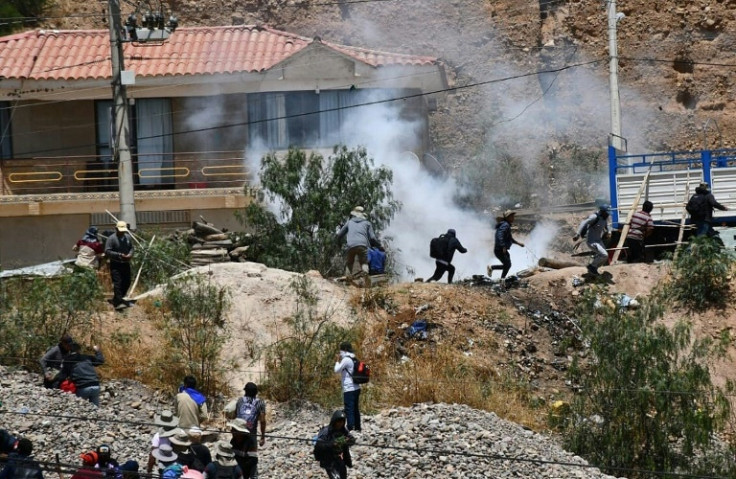
Supporters of former Bolivian president Evo Morales blocked two major roads and clashed with police on Monday over the ex-leader's possible arrest in the coming days over allegations that he raped a teenage girl.
The blockages, which the protesters said would be indefinite, began at dawn and are concentrated on two roads that connect the department of Cochabamba -- where Morales spends most of his time -- with the cities of Sucre and Santa Cruz.
"This afternoon, tomorrow and into the next few days, the entire country will be blocked," Ponciano Santos, secretary of a trade union involved in the protest, told the press.
In the town of Parotani on the road leading to La Paz, protesters clashed with police who used tear gas to subdue them. Police confirmed reports that at least six people had been arrested.
Organizers said in a statement that they had mobilized "to protect the freedom, integrity and (prevent) the kidnapping" of Morales.
As tensions grew, Bolivian President Luis Arce, an arch-rival of Morales, changed the top leadership of the country's security forces and nine department heads.
Morales, 64, is accused of rape, human trafficking and human smuggling over his alleged sexual relationship with a 15-year-old member of his political youth guard in 2015.
In 2016, the girl gave birth to a daughter, whom Morales is accused of fathering.
On Thursday, he failed to comply with a prosecutor's summons to give a statement, which could lead to an order for his arrest.
The prosecutor in charge of the investigation, Sandra Gutierrez, declined to answer journalists' questions on Monday as to whether she would ask for Morales's arrest.
However the alleged victim's father was arrested on Friday for similarly failing to comply with a summons and placed in pretrial detention for four months.
The girl's parents are suspected of having enrolled her in Morales's youth wing with the aim of political advancement and personal gain in exchange for their daughter.
Elected Bolivia's first Indigenous president in 2006, Morales claims the allegations against him were fabricated by the Arce government to try to discredit him.
Morales's lawyers meanwhile have said the probe into the matter is "illegal," arguing that an investigation in 2020 into the same claims was closed for lack of evidence.
The former coca grower, who served as president from 2006 until 2019, was highly popular in the Andean country until he tried to bypass the constitution to seek a fourth term.
He was forced to resign after losing the support of the military following an election marked by allegations of fraud.
Arce served as his finance minister for more than a decade but the pair later fell out.
Morales led several thousand supporters on a march in September, arriving in the capital after violent clashes with opponents and demanding the president's cabinet be reshuffled.




